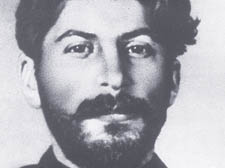| |

Young Stalin |
How the young Joe went from peasant to Lenin’s fixer
Young Stalin
by Simon Sebag Montefiore (Weidenfeld & Nicolson) £25
STALIN, like Hitler, was an outsider. Born December 17 1877 as Josef Vissarionovitch Djugushvili, the son of a drunken cobbler in Gori, Georgia, he learned Russian only as a second language.
He abandoned training for the priesthood in Tiflis to embark on a career of political radicalism in the Caucasus, involving him in bank robbery and the murder of suspected informers. This brought him inevitably to the attention of the Okhrana, the Tsarist secret police, and to lengthy sentences of exile in Siberia.
Young Stalin contains many good things. Simon Sebag Montefiore has unearthed a wealth of detailed, often new, material about Stalin’s early life. He is excellent on Stalin’s years as a schoolboy and seminary student in Gori and Tiflis. A precocious schoolboy, with a beautiful tenor voice, Stalin was a voracious reader. A published poet in Georgian, the paradox is that the peasant Stalin was far more of a genuine intellectual than Hitler. Young ‘Soso’, one of his many nicknames and aliases, impressed everyone who met him as forceful and remarkable, but at the same time unpredictable and dangerous.
Stalin’s escape from Georgia, and from the periphery, came when he travelled to Finland in 1905 to meet Lenin, becoming his trusted fixer and fund-raiser. Lenin’s support ultimately led Stalin to power. More cosmopolitan than Hitler, he worked hard at learning English and German. Stalin even attended a revolutionary conference in the Brotherhood Church in Southgate Road in Islington in 1907. He and Hitler also lived at the same time in Vienna in 1913, both favouring walks in the park surrounding Schönbrunn Palace.
The Okhrana, staffed by professionals skilled at infiltration, was benign compared to its successors, Lenin’s Cheka and Stalin’s NKVD. It seldom sought the death penalty and its arrests were numbered in thousands rather than millions. Exile in Siberia was a prolonged reading holiday and escape was commonplace. So successful, however, was the Okhrana at infiltration that, when he came to power, Stalin trusted nobody, leading to the deaths of most of those he had known in his youth and countless millions more.
For all its merits, Young Stalin leaves out most of the politics for the sake of a good story. It gives little impression of Russian, or even Georgian, life. It is also often inelegantly written, with too many colloquialisms and too much borrowed from the vocabulary of Chicago gangsters. |
| |
|
 |
|
| |
 |



